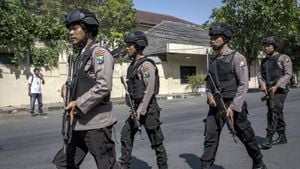The Vietnamese government is embarking on significant restructuring efforts within its bureaucratic framework, aiming to streamline operations and reduce personnel costs. This initiative is part of a broader strategy to improve government efficiency, as directed by the Communist Party of Vietnam. On February 25, 2025, major resolutions were passed to facilitate these changes, including reduced government agencies and personnel.
The restructuring process includes the consolidation of various departments, leading to the proposed reduction of civil servants by at least 20%. Prime Minister Phạm Minh Chính has emphasized the need for this reorganization to align with the government's goals of efficiency and financial economy.
With these adjustments, Hanoi is set to see its administrative departments cut down to 15 from 21. The session held by the People's Council of Hanoi on the outlined date led to the agreement on these resolutions, marking what local officials claim as necessary steps toward modernizing the governance model.
Chairman of the State Lương Cường remarked, "Hà Nội đã hoàn thành báo cáo văn kiện đại hội và đề án nhân sự Đại hội đại biểu đảng bộ tỉnh Quảng Ninh nhiệm kỳ 2025-2030 với Bộ Chính trị trong tháng 8 và tiến hành đại hội trước ngày 31/10," highlighting the proactive responses of the local governments to central directives.
Meanwhile, Minister of Home Affairs has assured the public of significant savings under the outlined plan, aiming for at least 20% reductions in budget-dependent bureaucratic jobs as part of the 2025 fiscal strategy.
The broader pertinence of these adjustments reflects the government's ambition to adapt to changing socio-economic dynamics, emphasizing preventative measures against inefficiency and wastefulness. It marks the government's initiative as proactive amid public expectations for transparent and effective governance.
Quảng Ninh's leadership also reported on the positive strides taken, maintaining economic growth objectives at 14% for upcoming fiscal periods, showcasing resilience against challenges stemming from natural calamities.
For the forthcoming two-year span from 2025 to 2027, the reform intends to implement strict regulations on administrative processes, aimed at sustaining continuity and efficiency even as departments are reorganized.
The emphasis on detailed instruction for restructuring has raised queries about operational efficacy and public accessible service continuity during the transition. Citizens worry about whether changes will lead to confusion about administrative procedures and necessary document modifications.
Despite these potential hurdles, local leaders assert compatibility with national directives ensures the operations will be devoid of service interruptions. Similarly, the government has recently convened to confirm operational plans with top officials from the Ministry of Home Affairs on potential collaborations on aviation developments.
One local official noted, "Tỉnh Quảng Ninh khẳng định, trong nhiều năm qua, luôn là một trong các địa phương đi đầu cả nước trong việc triển khai thực hiện các chỉ đạo, định hướng của Trung ương," emphasizing the province's continuous struggle to excel under directives.
This consolidation approach aligns with Vietnam's historical trend of administrative reorganizations aimed at increasing operational efficiency. With each restructuring phase, the country endeavors to fine-tune its bureaucratic processes, adapting to the needs of modern governance.
While the restructuring efforts have sparked discussion among citizens about potential vulnerabilities, government officials remain optimistic, making the case for continued administrative efficiency after the implementation of new systematic shifts.
Overall, the Vietnamese government's current course of action through these restructuring initiatives marks not just operational transitions but also reflects significant ideological shifts within governance approaches. Indeed, the communist leadership is positioning itself to reassert its grip on efficient governance under changing societal expectations.



